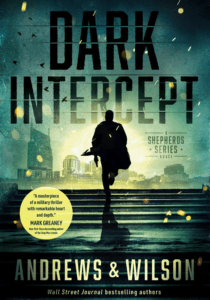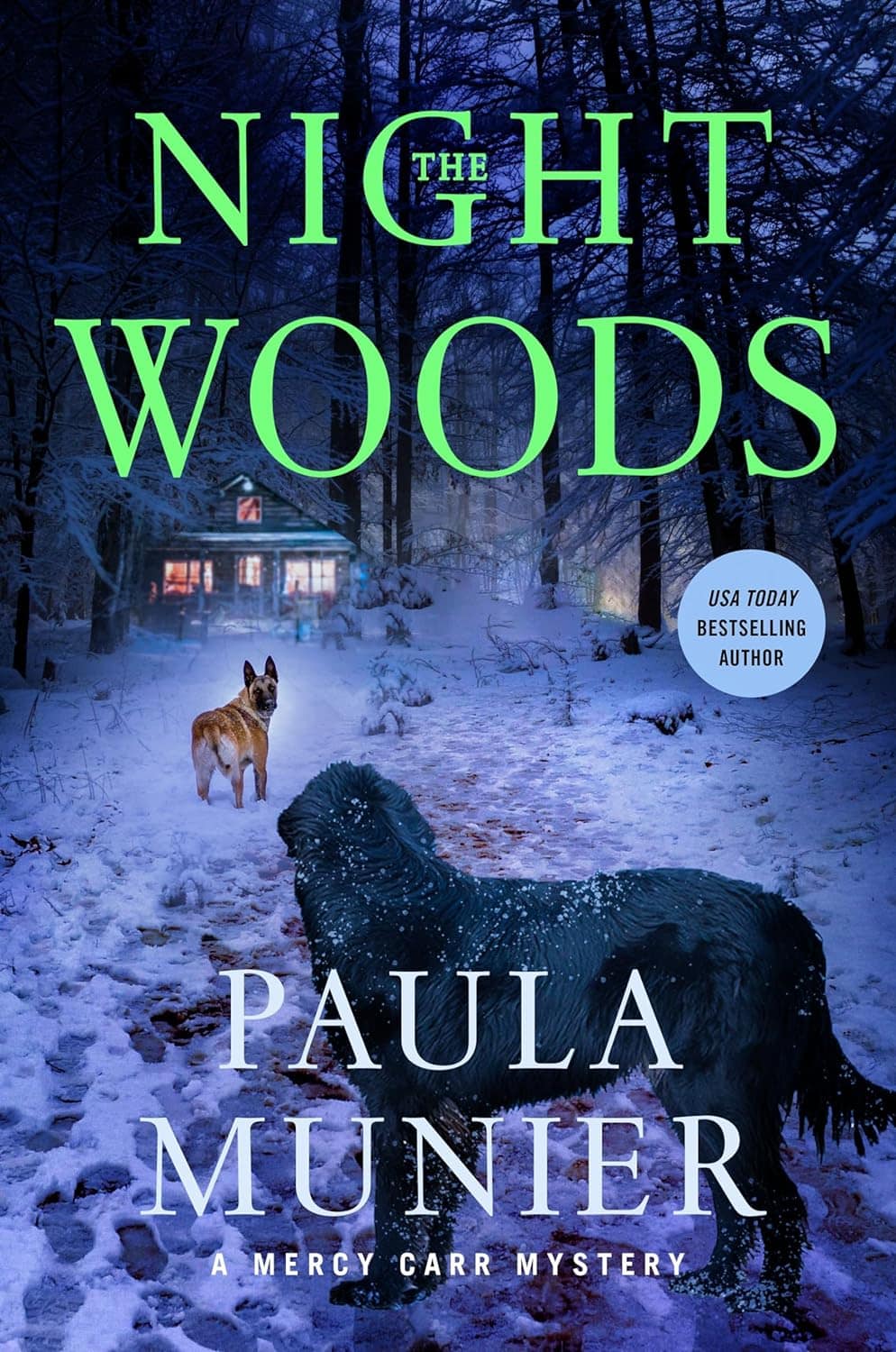WRITING FAITH IN FICTION
Questions of faith are a universal part of the human experience, no matter how writers and their readers eventually answer these questions for themselves. Yet, themes of faith, doubt, crisis, and belief are rarely found in the pages of thriller fiction, with some notable exceptions of course. Recently, we (Andrews & Wilson) had the honor of launching a new thriller series for Tyndale House, the leading Christian publisher in the world and it has us thinking a lot about both the changing face of faith based fiction, and the expression of faith based questions and themes outside of that market space.
If our challenge is to write realistic and exciting thrillers that resonate with our readers, then having characters who experience something so universal would seem not only appropriate, but appealing. But how can you weave these themes into a novel without it bogging down the plot, pacing, action, or characters? The simple answer is the same way you deal with other common challenges characters face such as self-doubt, regret, fear, loss. But let’s look at a few points we’ve learned while creating The Shepherds series that might help you avoid common pitfalls.
(1) Be Real
One of the things that always bothers me in books and film is when two characters, rushing to the scene of a terrorist attack, take the time dive into a discussion about a relationship subplot the writers want to develop. Why? Because when a detective is rushing to a crime scene or a Navy SEAL is helicoptering in thwart a terrorist attack, they simply don’t do that! In real life, the professional’s mind is on the job. In the case of the detective, she’s working the case angles, considering implications, and prepping for the aftermath. The Navy SEAL is thinking through potential combat scenarios, querying for real time target information, and checking his kit and weapons. In real life, pros don’t have deeply personal in emotional conversations at those moments, so writing these scenes in a work of fiction just isn’t realistic.
Find appropriate times for your characters to have these conversations or for a character to ruminate these questions in their internal monologue.
The same is true for dealing with faith-based themes. Find appropriate times for your characters to have these conversations or for a character to ruminate these questions in their internal monologue. And, don’t build it to big, because again, when someone expresses doubts or struggles they may certainly get words of encouragement, but it would be very unusual for them to get a detailed, well scripted sermon on the subject. Similarly, we often will have a character think briefly of these things, arrive at some interim conclusion, and then move on to other thoughts, just as we do in real life. Understand that in a drama story there may well be a time and place for long exposition on these themes, usually through appropriate dialogue between characters. Lengthy sidebars about faith or other philosophical themes is debilitating to the pacing of a thriller. Have your characters share, but in a way realistic for the setting of the scene.
(2) Don’t Preach
Hint, discuss, use metaphor or plot devices…but never preach. Readers—especially in today’s hyper-partisan and polarized world—do not like to be told what to think. Readers want to be entertained and, in a thriller, to be thrilled. Readers LOVE to learn, but oh, how they hate to be taught.
Fans of fiction are not buying your book to “educated” on your world views, politics, or spiritual belief system.
Share your themes and thoughts in realistic, small bites, rather than a big data dumps or diatribes. One trick we’ve found—more of a litmus test, perhaps, is to evaluate dialogue with this question in mind: “Is this something my character would realistically say, or is it something that “I the author” want to say to the reader?” If the answer is the latter, then you’ve crossed the line into teaching and preaching instead of entertaining with a message as subtext.
(3) Show Don’t Tell
Who hasn’t had this pearl of writer’s wisdom hammered into them as they develop their craft? It is one of the central tenets of good storytelling and may be more important when it comes to Faith in Fiction than anywhere. This point is very much linked to both one and two above, but here the idea is that we need share our characters questions or struggles with faith through their actions rather than in using the narrative as a platform.
Remember, your readers are smart! They’ll get it—just show them.
Here’s an example from Dark Intercept: Our main character, Jedidiah Johnson, has an enormous crisis in his faith after experience a terrifying event as a teen—something referenced throughout the book. However, no where in the narrative does Jed say or think: “I ran away from my life because my faith was shaken by this terrible thing.” Instead, we show Jed’s internal crisis by his choices and reactions to the event—turning insular, abruptly leaving home, abandoning his plans for a career in ministry, leaving his friends and family, and enlisting in the Navy to be come a SEAL. His actions tell the reader everything they need to know.
(4) Let the Characters Have a Journey
We’re all good at doing this with plot, but like me, perhaps you have a harder time letting the subtext and themes unfold slowly as a journey for your characters. If your protagonist figured out the antagonist’s plan immediately, and thwarted it without any twists and missteps, your thriller would not only be incredibly short, it would be incredibly boring! We’re used to plot getting all sorts of twists and turns, missteps and miscues, feints and parries…why not do the same for your character’s headspace!
Let your character’s relationships as well as their struggles with doubt, loss, growth, and yes even faith evolve over time in just the same way. Questions of faith and/or beliefs in your book don’t have to asked and answered in a single dialogue exchange. Instead, let it simmer and grow over time, fading to the background, rearing its head again, moving the character along throughout the book, or perhaps even over several books in a series. Better yet, work the questions and the answers into the plot, weaving the thread deeply into the tapestry of the story and characters, instead of painting it on top in bright red! The reader will identify with, and therefore enjoy, the character’s journey through the theme so much more.
There are many, many ways to weave themes and subtext about faith into thriller fiction, but these are some basic guidelines, earned through our own mistakes and stumbles, I might add, that might help you get started. And don’t be afraid to add these themes to your thriller, because they are a universal part of the human experience. For your readers to relate to thematic elements, they must identify with the character through the the struggle of shared human condition.
The conversation continues on Facebook…let us hear what you think!
 Jeffrey Wilson has at one time worked as an actor, a firefighter, a paramedic, a jet pilot, a diving instructor, a Naval Officer, and a Vascular and Trauma Surgeon. He also served numerous tours in Iraq and Afghanistan as a Navy combat surgeon, deploying with an east coast based SEAL Team as part of a Joint Special Operations Task Force. Jeff and his wife, Wendy, are Virginia natives who, with children Ashley, Emma, Jack, and Connor, call Tampa, Florida home. He still works as a consultant for the Department of Defense when not hard at work on his next book.
Jeffrey Wilson has at one time worked as an actor, a firefighter, a paramedic, a jet pilot, a diving instructor, a Naval Officer, and a Vascular and Trauma Surgeon. He also served numerous tours in Iraq and Afghanistan as a Navy combat surgeon, deploying with an east coast based SEAL Team as part of a Joint Special Operations Task Force. Jeff and his wife, Wendy, are Virginia natives who, with children Ashley, Emma, Jack, and Connor, call Tampa, Florida home. He still works as a consultant for the Department of Defense when not hard at work on his next book.
He is the co-author, with Brian Andrews, of the Wall Street Journal and Amazon #1
Bestselling TIER ONE series of thrillers from Thomas & Mercer. He and Andrews also co-author the SONS OF WAR series (Blackstone Publishing) THE SHEPHERDS (Tyndale House) which has been optioned for television, and the WEB Griffin Presidential Agent Series (GP Putnam Sons.)
He is the author of three award winning Supernatural thrillers from JournalStone Publishing: THE TRAITEUR’S RING (2011), THE DONORS (2012), and FADE TO BLACK (2013). He is also the author of the faith based, inspirational war time novel WAR TORN.
His latest release, DARK INTERCEPT, is a #1 Audible bestseller in military and supernatural fiction and is available now!
Learn more about Jeff at www.andrews-wilson.com





